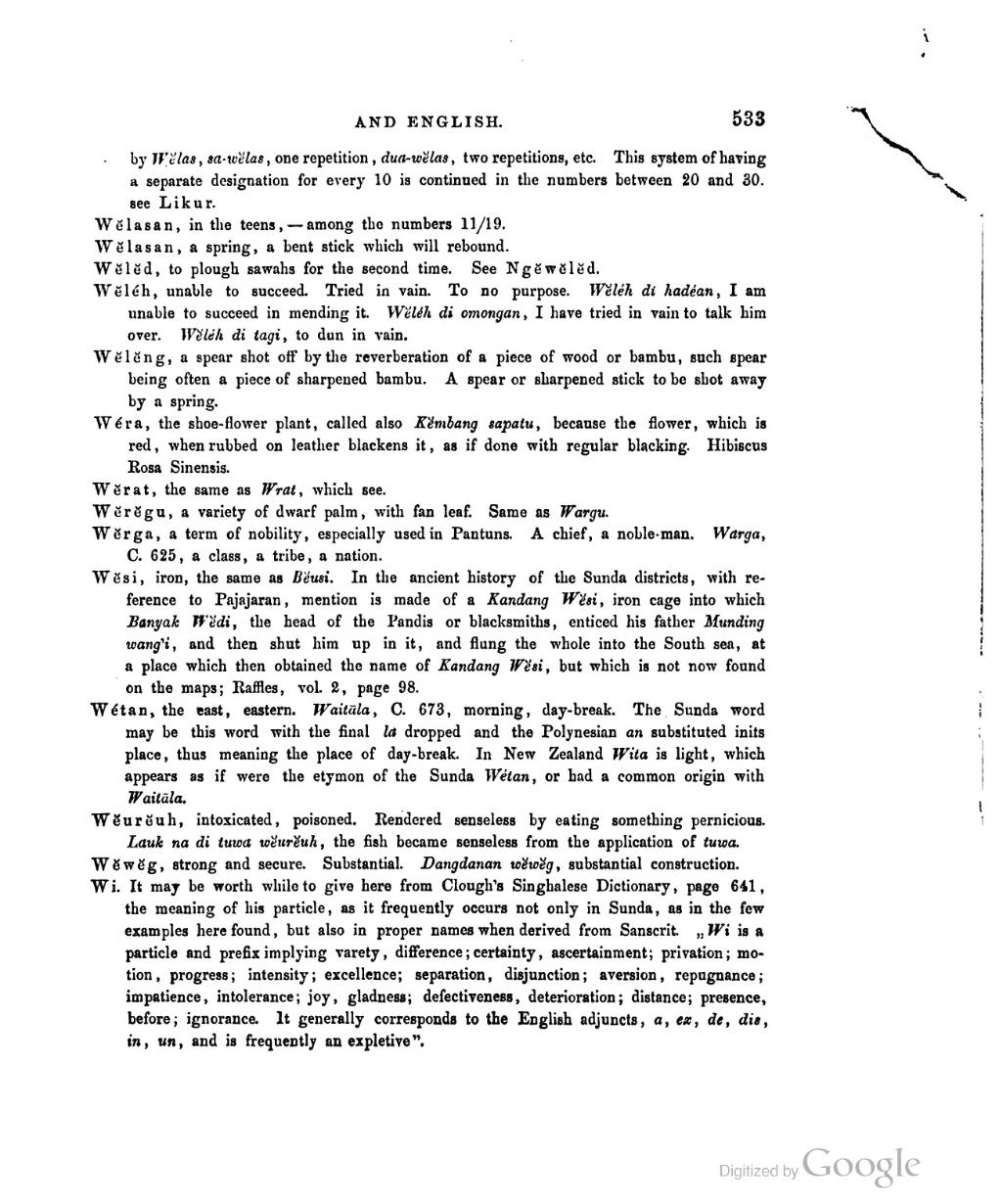by Wělas, sa-wělas, one repetition, dua-wělas, two repetitions, etc. This system of having a separate designation for every 10 is continued in the numbers between 20 and 30. see Likur.
Wělasan, in the teens, —among the numbers 11/19.
Wělasan, a spring, a bent stick which will rebound.
Wělěd, to plough sawahs for the second time. See Ngěwělěd.
Wěléh, unable to succeed. Tried in vain. To no purpose. Wěléh di hadéan, I am unable to succeed in mending it. Wěléh di omongan, I have tried in vain to talk him over. Wěléh di tagi, to dun in vain.
Wělěng, a spear shot off by the reverberation of a piece of wood or bambu, such spear being often a piece of sharpened bambu. A spear or sharpened stick to be shot away by a spring.
Wéra, the shoe-flower plant, called also Kěmbang sapatu, because the flower, which is red, when rubbed on leather blackens it, as if done with regular blacking. Hibiscus Rosa Sinensis.
Wěrat, the same as Wrat, which see.
Wěrěgu, a variety of dwarf palm, with fan leaf. Same as Wargu.
Wěrga, a term of nobility, especially used in Pantuns. A chief, a noble-man. Warga, C. 625, a class, a tribe, a nation.
Wěsi, iron, the same as Běusi. In the ancient history of the Sunda districts, with reference to Pajajaran, mention is made of a Kandang Wěsi, iron cage into which Banyak Wědi, the head of the Pandis or blacksmiths, enticed his father Munding wang'i, and then shut him up in it, and flung the whole into the South sea, at a place which then obtained the name of Kandang Wěsi, but which is not now found on the maps; Raffles, vol. 2, page 98.
Wétan, the east, eastern. Waitāla, C. 673, morning, day-break. The Sunda word may be this word with the final la dropped and the Polynesian an substituted inits place, thus meaning the place of day-break. In New Zealand Wita is light, which appears as if were the etymon of the Sunda Wétan, or had a common origin with Waitāla.
Wěurěuh, intoxicated, poisoned. Rendered senseless by eating something pernicious. Lauk na di tuwa wěurěuh, the fish became senseless from the application of tuwa.
Wěwěg, strong and secure. Substantial. Dangdanan wěwěg, substantial construction.
Wi. It may be worth while to give here from Clough's Singhalese Dictionary, page 641, the meaning of his particle, as it frequently occurs not only in Sunda, as in the few examples here found, but also in proper names when derived from Sanscrit. "Wi is a particle and prefix implying varety, difference; certainty, ascertainment; privation; motion, progress; intensity; excellence; separation, disjunction; aversion, repugnance; impatience, intolerance; joy, gladness; defectiveness, deterioration; distance; presence, before; ignorance. It generally corresponds to the English adjuncts, a, ex, de, dis, in, un, and is frequently an expletive".
